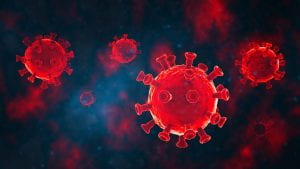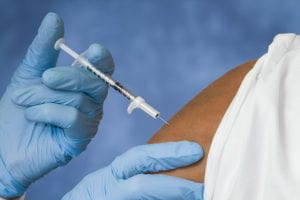 More than four years after the first humans became infected with the SARS-CoV-2 virus, scientists understand more than ever before about how COVID-19 affects people. Beyond respiratory symptoms, COVID can lead to nausea, vomiting, diarrhea, rashes, and even eye infections. We’ve also learned that people can experience long COVID, which involves continued symptoms for months or even years after they initially get sick. [Read more…]
More than four years after the first humans became infected with the SARS-CoV-2 virus, scientists understand more than ever before about how COVID-19 affects people. Beyond respiratory symptoms, COVID can lead to nausea, vomiting, diarrhea, rashes, and even eye infections. We’ve also learned that people can experience long COVID, which involves continued symptoms for months or even years after they initially get sick. [Read more…]
Do COVID Infections Impact Mental Health?
What We Can Do About Vaccine Hesitancy
Currently, 62 percent of Americans age 5 and up are fully vaccinated for COVID-19, with 34 percent having received a booster dose. That leaves more than 100 million Americans who have made the choice to skip the COVID-19 vaccine despite clear evidence that the jabs help prevent serious illness.
Vaccine hesitancy is a serious public health challenge—one that researchers are learning more about. What’s going on here? [Read more…]
How the Pandemic Has Affected Our Mental and Physical Health
 We’re more than one year into the global pandemic that has kept many Americans sequestered in their homes and taking precautions to prevent the spread of COVID-19 when they go out. Not surprisingly, these changes in how and when we interact with others has led to changes in our mental and physical health. Among those changes, emerging data show that many Americans have gained weight, are drinking more alcohol and are not sleeping well. [Read more…]
We’re more than one year into the global pandemic that has kept many Americans sequestered in their homes and taking precautions to prevent the spread of COVID-19 when they go out. Not surprisingly, these changes in how and when we interact with others has led to changes in our mental and physical health. Among those changes, emerging data show that many Americans have gained weight, are drinking more alcohol and are not sleeping well. [Read more…]
A Pet Could Boost Your Mental Health
If you don’t have a pet, you may think about what caring for an animal entails: feeding, training, cleaning up after and paying veterinary bills. But most pet owners understand that pets provide them with benefits as well.
[Read more…]
Your Mental Health May Affect Your Vaccine Response
Nearly 30 million Americans have received a dose of the COVID-19 vaccine – thanks to a national effort to return the country to “business as usual” after a year of restrictions designed to stop the deadly virus’s spread.
One important component of this effort is maximizing the vaccine’s level of protection for each recipient. With this in mind, researchers from Ohio State University have summarized the evidence to date on how social and psychological factors impact our biological responses, specifically to vaccines. Their article was published last month in the journal Perspectives on Psychological Science. [Read more…]
The Mental Health Costs of Caring for COVID-19 Patients
 More than 125,000 Americans are currently hospitalized with COVID-19 – more than at any other point during the pandemic. Most of these patients are seriously ill, with low oxygen levels and potential organ failure. Most need constant monitoring and many need a ventilator because they are not able to breathe. [Read more…]
More than 125,000 Americans are currently hospitalized with COVID-19 – more than at any other point during the pandemic. Most of these patients are seriously ill, with low oxygen levels and potential organ failure. Most need constant monitoring and many need a ventilator because they are not able to breathe. [Read more…]
Gratitude Isn’t Cancelled This Thanksgiving
 Like many events this year, Thanksgiving will be a starkly different holiday for most people. Rising cases of COVID-19 mean that many will forgo gathering with family and friends, instead staying home during what used to be America’s biggest travel holiday.
Like many events this year, Thanksgiving will be a starkly different holiday for most people. Rising cases of COVID-19 mean that many will forgo gathering with family and friends, instead staying home during what used to be America’s biggest travel holiday.
While big dinner parties may not be possible, there is one element of Thanksgiving that can stay despite the global pandemic: the notion of giving thanks. [Read more…]
How to Cope With the Winter Blues and COVID-19
 In the northern hemisphere, darkness now falls before dinnertime. Most northern latitudes have less than ten hours of daylight in November – meaning most people spend the majority of their day light hours at work.
In the northern hemisphere, darkness now falls before dinnertime. Most northern latitudes have less than ten hours of daylight in November – meaning most people spend the majority of their day light hours at work.
Evidence clearly establishes that darkness impacts the moods and mental health of millions of people. Seasonal Affective Disorder (SAD) is a well-founded medical condition that affects about 5 percent of Americans; and another 15 percent experience a milder form of SAD, often referred to as the “winter blues.” [Read more…]





